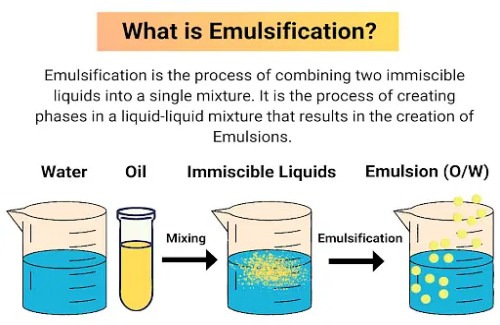The Chemistry Behind Emulsifiers and How They Work
The Chemistry Behind Emulsifiers and How They Work
Blog Article
The Scientific research Behind Emulsifiers and Their Significance in Modern Manufacturing
Emulsifiers play an important role in modern manufacturing, acting as the unrecognized heroes that mix oil and water for a large variety of products. As customer preferences change towards cleaner tags, the demand for ingenious emulsifiers is growing.
What Are Emulsifiers?
Emulsifiers are essential representatives in the globe of food and product production, acting as the glue that binds 2 otherwise immiscible liquids, like oil and water. Usual examples consist of lecithin located in egg yolks and soybeans, and mono- and diglycerides utilized in numerous processed foods.

When you whip up a salad clothing or delight in a luscious treat, emulsifiers help maintain that perfect appearance. Without emulsifiers, many foods would divide, leading to unwanted appearances and tastes.
The Chemistry of Emulsification
When you mix oil and water, you could observe they don't blend conveniently; that's where the chemistry of emulsification comes right into play. To overcome this challenge, emulsifiers are used.
These particles have a hydrophilic (water-attracting) head and a hydrophobic (water-repelling) tail. When you add an emulsifier, its particles place themselves at the oil-water interface, decreasing surface area stress and allowing the beads to blend. The emulsifier forms a safety layer around each droplet, preventing them from integrating back into different layers. Comprehending this chemistry is important for achieving security in products like dressings, lotions, and sauces, making emulsification essential in modern-day manufacturing.
Types of Emulsifiers
Numerous kinds of emulsifiers play crucial functions in maintaining blends of oil and water. You'll frequently run into two major categories: all-natural and synthetic emulsifiers. All-natural emulsifiers, like lecithin from egg yolks or soy, are derived from plants and pets, making them prominent in food. They're normally thought about more secure and healthier choices.
On the other hand, artificial emulsifiers, such as mono- and diglycerides, are chemically engineered to boost stability and rack life. They're generally used in refined foods and aesthetic items.
Additionally, you may stumble upon non-ionic, anionic, and cationic emulsifiers, each with unique residential or commercial properties that impact their efficiency. Non-ionic emulsifiers, for instance, job well in a vast array of pH degrees, while anionic emulsifiers often tend to execute better in alkaline conditions. Comprehending these types can assist you select the appropriate emulsifier for your specific application.
Mechanisms of Emulsion Formation
Comprehending exactly how emulsions create is crucial for developing secure blends of oil and water. When you introduce an emulsifier, it decreases the surface tension in between the 2 fluids, enabling them to mix more conveniently.
The emulsifier molecules have a hydrophilic (water-attracting) head and a hydrophobic (oil-attracting) tail. When you add an emulsifier, these particles organize themselves at the oil-water interface. The hydrophilic heads connect with water, while the hydrophobic tails anchor into the oil. This develops a barrier that maintains the droplets, stopping them from integrating.
Applications of Emulsifiers in Numerous Industries
Emulsifiers play an important role throughout various markets, making your preferred foods smoother and much more pleasurable. In cosmetics, they enhance product structure and stability, making certain an enjoyable application experience. And also, in pharmaceuticals, they aid deliver crucial components properly, improving total efficacy.
Food Market Makes Use Of
While you may not recognize it, emulsifiers play a necessary duty in the food sector, boosting the appearance, security, and rack life of lots of items. In baked products, emulsifiers enhance dough handling and maintain dampness, resulting in a far better appearance and expanded quality. By making certain harmony and top quality, emulsifiers are substantial to delivering the scrumptious items you appreciate every day, making them an essential ingredient in modern food additional reading production.
Cosmetic Solutions Advantages
When it pertains to cosmetic formulations, emulsifiers are vital for developing items that feel luxurious and execute successfully. They assist blend oil and water, making certain a smooth and secure uniformity in lotions, lotions, and serums. You'll discover that emulsifiers boost item security, protecting against separation and lengthening life span. This implies you can appreciate your favorite moisturizer without fretting about it spoiling also rapidly. Additionally, emulsifiers boost the application experience, permitting also distribution and better absorption right into the skin. By utilizing emulsifiers, you additionally achieve an even more attractive appearance, making imp source your cosmetics feel fascinating on your skin. Generally, emulsifiers play an important function in delivering high-grade cosmetic products that fulfill your charm demands.
Drug Applications Review
In the pharmaceutical industry, emulsifiers are necessary for creating effective medicines. They assist develop secure mixes of oil and water, making sure that energetic components are equally distributed and easily taken in by the body. You'll discover emulsifiers in numerous dose kinds, like creams, ointments, and liquid suspensions, improving the bioavailability of medications. They likewise boost the appearance and security of items, making them extra appealing and simpler to utilize.
The Impact of Emulsifiers on Product Top Quality

By ensuring steady solutions, you decrease the threat of putridity and expand rack life, eventually conserving you time and money. You'll also discover that emulsifiers can enhance the bioavailability of active components in your products, making them a lot more reliable for customers.
In addition, they enable you to produce ingenious formulations that fulfill varied customer requirements. Whether you're crafting a velvety clothing or an extravagant lotion, emulsifiers are vital for accomplishing the wanted results. In short, by comprehending and leveraging the impact of emulsifiers, you can greatly raise the high quality of your items.
Future Trends in Emulsifier Growth
As the need for cleaner tags and lasting products rises, the advancement of new emulsifiers is readied to evolve substantially. You'll notice a change towards plant-based and natural emulsifiers, driven by customer preferences for active ingredients that are eco-friendly and less refined. Innovations in biotechnology will likely improve the performance and effectiveness of these emulsifiers, allowing suppliers to produce stable formulations with fewer additives.
You might additionally see a boost in multifunctional emulsifiers that not only support emulsions yet likewise improve taste, appearance, or nutritional worth. This pattern might streamline ingredient lists while boosting item performance.
Moreover, with advancements in nanotechnology, emulsifiers can be crafted at the molecular level to attain extraordinary stability and performance. Emulsifiers. As you check out these patterns, you'll locate that the future of emulsifier growth is not almost capability, but likewise regarding welcoming sustainability and openness in components
Regularly Asked Concerns
Are Emulsifiers Safe for Usage in Food Products?
Yes, emulsifiers are generally secure for intake in food items. They've been thoroughly studied and authorized by food security authorities, so you can appreciate your preferred foods without bothering with their find more info influence on your health.
Can Emulsifiers Be Derived From All-natural Resources?
Yes, you can derive emulsifiers from all-natural sources. Ingredients like lecithin from egg yolks or soybeans and casein from milk are typical. These natural emulsifiers assist maintain mixtures without artificial ingredients, making them prominent in various products.

Just How Do Emulsifiers Affect Life Span of Products?
Emulsifiers stabilize blends, stopping splitting up and perishing - Emulsifiers. By keeping harmony, they prolong products' life span, making certain quality and top quality. You'll observe that emulsifiers aid maintain your favored foods and cosmetics doing well over time
What Are Potential Adverse Effects of Emulsifiers?
You could experience digestive concerns when consuming items with emulsifiers, as they can disrupt gut bacteria. Some studies suggest potential links to inflammation or allergic reactions, yet a lot more research is required to completely recognize these impacts.

Exist Alternatives to Conventional Emulsifiers?
Yes, there are choices to conventional emulsifiers. You can check out options like natural gums, starches, or lecithin. Each different offers distinct homes, so experiment to find what works best for your certain application.
Report this page